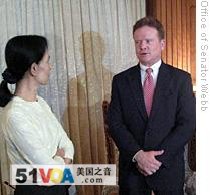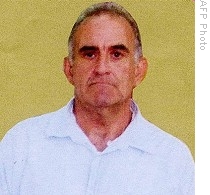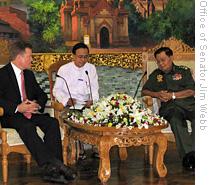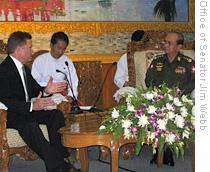Bangkok
15 August 2009
 |
| US Senator Jim Webb's meeting with Burma's opposition leader Aung San Suu Kyi in Rangoon, 15 Aug 2009 |
Within hours of holding talks with Burma's leader General Than Shwe in the administrative capital Naypyitaw, Senator Jim Webb flew to Rangoon and met with democracy leader Aung San Suu Kyi at a government guest house.
 |
| Handout photo taken on 13 May 2009, provided by Myanmar News Agency shows US Citizen John William Yettaw in Rangoon |
Webb secured the release of Yettaw, who had been sentenced to seven years in prison. Yettaw will leave Burma Sunday for Thailand together with the senator.
In a statement, Webb said he is grateful to Burma's government for honoring those requests. He says he hopes the U.S. and Burma could "take advantage of these gestures as a way to begin laying a foundation of goodwill and confidence-building in the future."
 |
| Senator Jim Webb's meeting with Burma's Chairman of the State Peace and Development Council Senior Gen. Than Shwe, in Naypyidaw, 15 Aug 2009 |
Both the White House and the State Department say Webb is not carrying any specific message from U.S. President Barack Obama.
Debbie Stothard, coordinator of the rights group, Alternative ASEAN Network on Burma in Bangkok says it is still unclear whether real political reforms in Burma will follow.
"General Than Shwe would have welcomed Senator Webb as an ally because Senator Webb has taken a public stand against US sanctions against the regime," she said. "He would have gone out of his way to grant Senator Webb a meeting with Aung San Suu Kyi."
"If we really want to see change, if we really want to see Senator Webb making a change on Burma, we've got to see the release of political prisoners and cessation of military hostilities against ethnic nationality groups," she added.
 |
| Senator Jim Webb's meeting with Burmese Prime Minister General Thein Sein, 14 Aug 2009 |
Webb's visit has raised speculation of a policy shift in Washington toward the repressive state. The White House said prior to the meeting that Webb would convey "strong" U.S. views on Burma's political future.
Last month, Secretary of State Hillary Clinton said the release of Aung San Suu Kyi would open doors for an expansion in bilateral ties and U.S. investments in Burma. The U.S. has imposed economic sanctions on Burma's government, including an investment ban, because of the government's repressive policies.